Edward Taker, c1865-a1909
aka Edward Teager, Edward Teaguer
Son of Jim Taker and Ellen Farrell
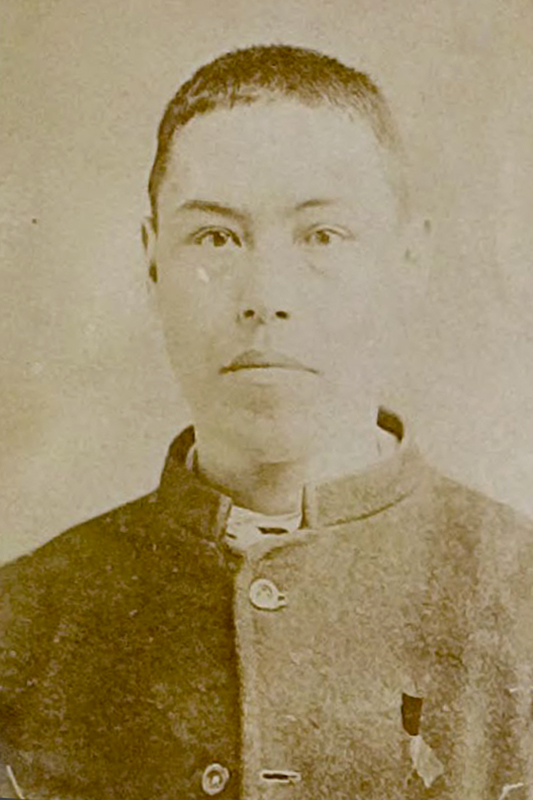
Discovery
Edward was a new character in the family saga. I had previously discovered three daughters of James and Ellen Teager (née Farrell): Victoria Julia, Mary Ann Edith, and Ellen. Julia was my great-great-grandmother. Believing the Teagers to be of Irish descent and that our Chinese connection began with Julia’s marriage to Ah Hiah, I was rather surprised to find the 1893 prison record for an Edward Teager with two photographs showing him to have very Chinese features [01]. A copy of his marriage certificate confirmed that he was the son of James and Ellen Teager (spelled Teaguer on the document). Was he the result of an affair between James and a Chinese women but recorded as Ellen’s son? Highly unlikely, as there were almost no Chinese women on the Victorian gold fields. Was he the result of an affair between Ellen and a Chinese man? Possibly, especially given my later discovery that James and Ellen’s third child, James, was actually the son of Ellen and police constable Christopher Molony. It all became clearer with the revelation that Jim/James Taker/Teager/Teaguer was Chinese from Amoy, so all of the children of James and Ellen (except James junior) were half-Chinese and half-Irish. It has turned out that Edward’s colourful career has provided a lot of information about him, mainly through newspaper reports, but there are also key gaps in the story.
Edward Taker – Childhood and Youth
1880: In 1880, Edward was arrested and charged with “being an idle and disorderly person, having no visible lawful means of support”. Described as a “half-caste Chinese, sixteen years of age”, he appeared before Justices of the Peace Hughes and Lynch at the Smythesdale Police Court on Thursday, 14 October 1880. He was remanded until the following Tuesday and ordered to be “examined by a medical man“. The newspaper noted that: “it is being reported that the accused had been guilty of an abominable offence” [02]. The newspaper reported him as Edward Teaguer, which seems to be the earliest mention of this spelling.
The following Tuesday – 19 October – he was again in the Smythesdale Police Court, appearing before J Keith, JP, and K Lynch, JP [03]:
Edward Teager, Chinese Interpreter
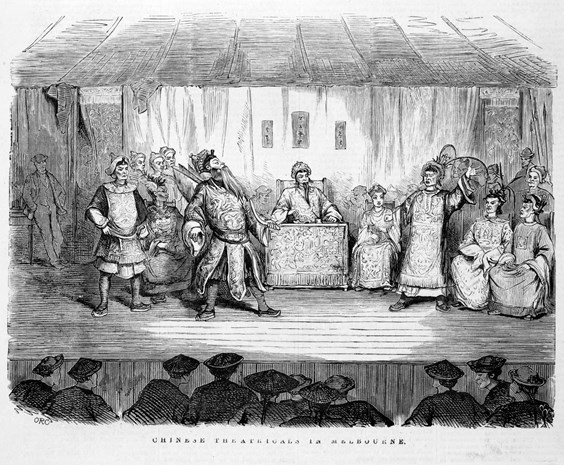
Impresario?
In a court appearance on 22 December 1892, Edward was committed for trial on a charge of perjury [07]. Bail was set on two sureties of £30 (or £50) each “and was immediately forthcoming” [08]. At the age of 27, how did Edward have that much money? A hint comes in a case in 1896, where he was said to have made £50 assisting the prosecution in another case (see below).
Edward was sentenced to two years hard labour.
1894: After release in from prison in 1894, Edward returned to work as an interpreter, including assisting legal counsel in court cases. He did have further run-ins with the law and the Chinese community over the next couple of years.
Edward Teaguer
Edward was using the Teaguer spelling by this stage – such as on his marriage certificate – though newspaper reports of his involvement in court cases in 1895 and 1896 still called him Teager. Meeting and marrying an actress is an interesting link back to the “Impresario” question mentioned above.
1896: July 1896 saw Edward arrested and subsequently appear in court on Wednesday, 29 July. Just the headlines in The Herald report are illuminating: “Chinese Devilment – A Half-Caste Interpreter – Charged With Vagrancy – Remarkable Case – Something About Clans – Chin and Cheong – Case Dismissed.” The court case makes interesting reading [09].
It would appear that Edward and Gertrude were setting up their wine shop. The fortnightly sitting of the Metropolitan Licencing Court at the Melbourne Insolvency Court on 2 September 1896 granted the transfer of a “colonial wine licence” from Henrietta Nichol to Gertrude Teaguer of 243 Gertrude Street, Fitzroy. Judge Molesworth and the Police Magistrates Joseph Anderson Panton and Charles Hope Nicolson were on the bench [10].
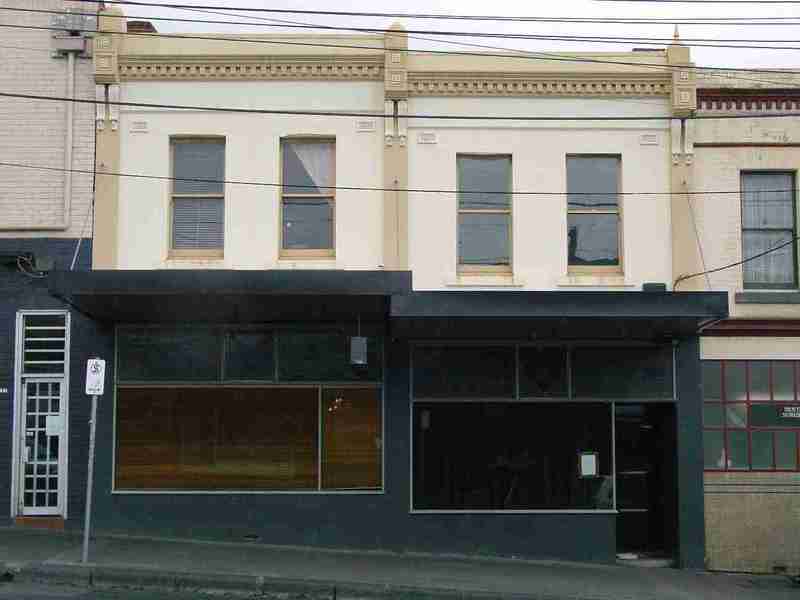
Whether as a result of these events and a desire to move or just a need to liquidate assets, Edward sold 243 Gertrude Street and its contents to Ellen Elizabeth Hayling, who is described as a financier, for £5. The contract is dated 22 December 1896. He also entered into a contract to rent it all back for £1 10/- per six week period. Seems like an odd arrangement as Hayling would make her money back in less than four months. Perhaps this had something to do with the creation of “E Teaguer and Co,” apparently in Western Australia (see below). Gertrude continued to operate the wine shop. In fact, she is listed in the 1897 edition of the Sands Directory at the wine shop at 243 Gertrude Street, Fitzroy. No mention of Edward and Gertrude is listed as “Miss G Teaguer.” Miss? [12].
The building at 243 Gertrude Street is still there. Combined with the neighbouring 245 Gertrude Street, it is a beer garden today – The Fitzroy Beer Garden – and part of a precinct of historical significance [13].
Perth
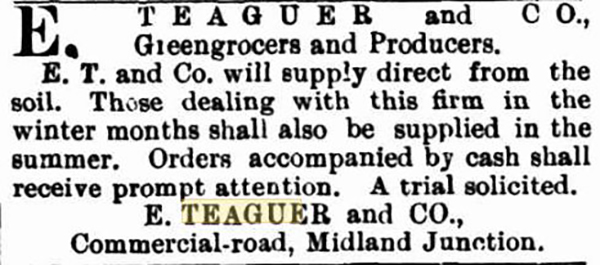
1897: An “E Teaguer and Co” advertised for four weeks from early September 1897 in the Coolgardie Miner: “E Teaguer and Co, Greengrocers and Producers. E T and Co will supply direct from the soil. Those dealing with this firm in the winter months shall be supplied in the summer. Orders accompanied by cash shall receive prompt attention. A trial solicited. Commercial-road, Midland Junction” [14]. The advertisement was also run in the Northern Mining Register and the Swan Advertiser. Midland Junction is about 15km north-east of Perth. Advertising in a Coolgardie newspaper is a bit strange, as Coolgardie is about 550km east of Midland Junction. At this stage I have no further information about this business and it is just the uniqueness of “E Teaguer” that makes the connection.
Meanwhile, the wine license for 243 Gertrude Street had been transferred from Gertrude to a Bessie Robertson on 17 March [15]. Coming only six months after gaining the wine license, this would suggest that the move to Perth could have been rather hasty.
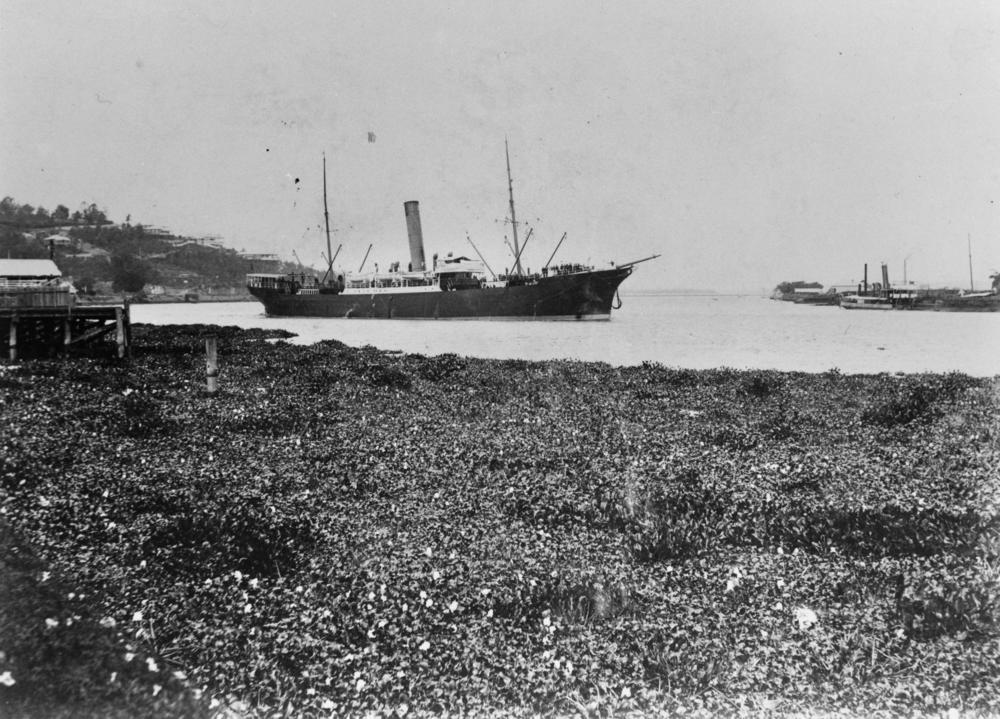
Edward seems to have got involved in the Chinese community straight away, so perhaps he moved to work specifically with the Chinese Freemasons or the Perth courts. In March 1898, the Perth Daily News published the Code of Rules for a proposed Chinese Freemasons Lodge at the request of “Mr E Teaguer, interpreter for the… lodge” [17]. It is worth quoting the Code of Rules in full, as its content and the desire to publish it show that the proposed lodge is obviously attempting to address some of the concerns of the European authorities and population about the Chinese community. It also shows the degree of Edward’s literacy and translation skills if he created the translation for publication alone.
1899: Edward appeared before Mr Augustus Sanford Roe, Police Magistrate, at the City Police Court on 13 March 1899:
The case went to trial before Mr Roe and W J Holmes, JP, on 20 March.
One later reference is the mention of “Edward Teaguer, a restaurant-keeper” [21].
Singapore and Disappearance?
1901: A Mr and Mrs Teaguer and infant travelled from Singapore to Fremantle in July 1901 on the Sultan. They are described as being of British nationality, which would be the case with Edward being born in Australia and Gertrude born in the UK [22]. The arrival of “Teaguer and infant” and “Teaguer” on 24 July is also reported in The Western Australian and Western Mail [23] [24].
If these are truly Edward and Gertrude, the date of the voyage to Singapore and the purpose of the trip are unknown. Why Singapore? His father came from Singapore, via Mauritius, Van Diemen’s Land, and South Australia. That may not be directly relevant, but family and business connections are possible. The infant is probably the child mentioned in the 1896 court case who would have been about 5 years old in 1901.
If they are not our Teaguers, there doesn’t seem to be any trace of who they were or what happened to them.
1902: A Mr Teaguer also travelled from Singapore to Fremantle on the Saladin in September 1902. He is described as English/British [25]
1903: A Mrs Teaguer, aged 25, and a male infant sailed on the Orotava in October 1902.
1913: The trail goes cold on my quest for Edward Teager after 1900-1903. It apparently also went cold for his wife, Gertrude, at some point. She ran notices in The West Australian: “If Edward Teaguer does not communicate with me within two months from this date I intend to re-marry.” [26].
Gertrude married Reuben James Stockden in Perth later in 1913, presumably after having her marriage to Edward anulled [27].
Footnotes
| 01⇧ | Teager, Edward, No 25842; Central Register for Male Prisoners, Volume 47, Prisoner Numbers 25810-26295, p 33 (Series VPRS 515 P0001) [Public Record Office Victoria, 4 April 2024]. |
|---|---|
| 02⇧ | Smythesdale Police Court; The Ballarat Star, 15 October 1880, p 2 [Trove, 4 April 2024]. |
| 03⇧ | Smythesdale Police Court; The Ballarat Courier, 21 October 1880, p 4 [Trove, 4 April 2024]. |
| 04⇧ | I have no other references to this wife and Trentham seems a strange place to live if Edward was working in Melbourne. When Edward married Gertrude Pearce in 1895, he identified himself as a “bachelor” |
| 05⇧ | Legislative Assembly; Western Mail (Perth), 23 September 1898, p 15 [Trove, 4 April 2024]. |
| 06⇧ | A Novel Theatrical Show – Chinese Plays in Melbourne; The Age (Melbourne), 2 January 1892, p 10 [Trove, 4 April 2024]. |
| 07⇧ | Melbourne; The Ballarat Star, 23 December 1892, p 4 [Trove, 4 April 2024]. |
| 08⇧ | Was It Perjury?; The Herald (Melbourne), 22 December 1892, p 1 [Trove, 4 April 2024]. |
| 09⇧ | Chinese Devilment; The Herald (Melbourne), 29 July 1896, p 1 [Trove, 4 April 2024]. |
| 10⇧ | Metropolitan Licensing Court; The Age (Melbourne), 4 September 1896, p 7 [Trove, 4 April 2024]. |
| 11⇧ | Victoria Police Gazette, 16 December 1896, p 387, and 23 December 1896, p 396 [Ancestry (Membership required) 4 April 2024]. |
| 12⇧ | Sands Directory, Melbourne, 1897, p 1131 [Ancestry (Membership required) 4 April 2024]. |
| 13⇧ | 243 Gertrude Street; Heritage Council of Victoria [Trove, 4 April 2024]. |
| 14⇧ | Advertising; The Coolgardie Miner, 2 September 1897, p 8 [Trove, 4 April 2024]. Repeated from 2 September 1897 to 4 October 1897. |
| 15⇧ | Metropolitan Licensing Court; The Argus (Melbourne), 18 March 1897, p 6 [Trove, 4 April 2024]. |
| 16⇧ | The SS Marloo was built in the UK in 1891 and initially operated as the Francesco Crispi. Purchased by the Adelaide Steamship Co, Ltd, in 1895, it operated around the Australian coast until wrecked off Fraser Island, Queensland, in 1914. Wikipedia |
| 17⇧ | Chinese Freemasons Code of Conduct; Daily News (Perth), 14 March 1898, p 3 [Trove, 4 April 2024]. |
| 18⇧ | City Police Court; The West Australian (Perth), 14 March 1899, p 7 [Trove, 4 April 2024]. |
| 19⇧ | Chinese and Interpreter; Daily News (Perth), 20 March 1899, p 3 [Trove, 4 April 2024]. |
| 20⇧ | City Police Court; The West Australian (Perth), 31 March 1899, p 3 [Trove, 4 April 2024]. |
| 21⇧ | Fremantle Police Court; The West Australian (Perth), 26 July 1899, p 2 [Trove, 4 April 2024]. |
| 22⇧ | Sultan Passenger List, 24 July 1901 [Ancestry (Membership required) 4 April 2024]. |
| 23⇧ | Shipping; The West Australian (Perth), 26 July 1901, p 4 [Trove, 4 April 2024]. |
| 24⇧ | Port of Fremantle; Western Mail (Perth), 3 August 1901, p 35 [Trove, 4 April 2024]. |
| 25⇧ | Saladin Passenger List, 1 and 2 September 1902 [Ancestry (Membership required) 4 April 2024]. |
| 26⇧ | Public Notices; The West Australian (Perth), 1 January 1913, p 1 [Trove, 4 April 2024]. Repeated on 2 January 1913. |
| 27⇧ | It is interesting that Edward’s nephews Edward and Harry Hiah and Edward Hiah’s wife Sadie were living at 246 Murray Street, Perth from at least 1903. Edward Hiah had his own interactions with the police and the Chinese gambling community over the next few years; had a market gardener partnership, possibly in Albany; and moved to Sydney and worked as a greengrocer until his death in 1919. The parallels with Edward Teager are interesting, almost as if Edward Teager disappeared and was replaced by Edward Hiah! |